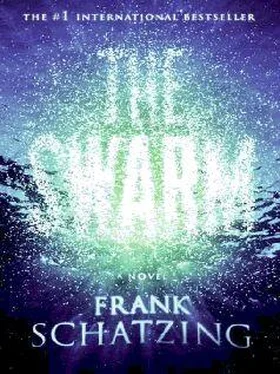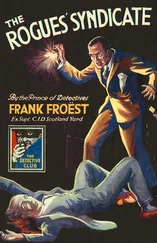'Where did you find that?' marvelled Oliviera, as they walked up the ramp.
'You don't find wine like this.' Johanson smirked. 'You have to bring it with you. I'm an expert at smuggling contraband goods.'
'Is it a good one? I don't know much about wines.'
'It's a Chateau Clinet from Pomerol, 1990 vintage. Lightens the wallet and the mood.' Johanson spotted a metal crate next to one of the booths between the ship's ribs. They headed over to it and sat down. The deck was deserted. The gateway to the starboard-side elevator gave them a clear view of the sea. The water lay calm and smooth in the half-light of the polar night, ice-free but wreathed in frosty mist. It was cold in the hangar bay, but they were in need of fresh air after hours in the containment lab. Johanson opened the bottle, poured some wine, and clinked glasses with Oliviera, a bright pinging sound.
'Lovely,' she said.
'I packed a few bottles for special occasions. And I'd say this is one of them.'
'Do you think we're on their scent?'
'We could be very nearly there.'
'So we've found the yrr?'
'Well, that's the question. We don't know what we've got inside that tank. Is it possible for single-cell organisms, for amoebas, to be intelligent?'
'When I look at humanity, I sometimes wonder whether we're much different from them.'
'We're more complex.'
'Is that an advantage?'
'What would you say?'
Oliviera shrugged. 'What kind of answer do you expect from someone who's spent the last God-knows-how-long doing nothing but microbiology? It's not like your job: there's no teaching involved. I never speak to a wider public, and I definitely suffer from acute lack of distance to myself. I'm a lab rat in human guise. I guess I tend to look at the world through my own specific lens, but I see micro-organisms wherever I go. We live in an age of bacteria. For over three billion years they've existed in their present form. Humanity is just a passing fashion, but even when the sun explodes, somewhere, somehow, a few of those microbes are bound to survive. They're the planet's real success story, not humans. I don't know if humans have any advantages over bacteria, but one thing's for certain: if we end up proving that microbes are intelligent, we'll be in more shit than they are.'
Johanson took a sip of wine. 'Just think of the embarrassment. Imagine the Church having to tell the faithful that God created his piece de resistance on the fifth day and not the seventh.'
'How are you managing to cope with all this?'
'So long as I've got a few bottles of vintage Bordeaux to hand, I don't see any major problems.'
'Aren't you angry?'
'With whom?'
'With those beings.'
'How would anger solve anything?'
'It wouldn't, Socrates.' Oliviera gave a wry smile. 'But I'm serious. I mean, they took away your home.'
'Part of it.'
'Don't you miss your house in Trondheim?'
Johanson swirled the wine in his glass. 'Not as much as I'd expected,' he said, after a moment's silence. 'It was a beautiful house, – but my life wasn't kept there. I have another a house by a lake in the middle of nowhere. You can sit on the veranda, look out at the water, listen to Sibelius and Brahms, and drink good wine. There's nothing like it.'
Johanson reached for the bottle and topped up their glasses. 'You'd understand if you'd been there. Watching the night sky reflected on the water – you can't forget a moment like that. Your whole existence seems to be concentrated in the stars. They're like pinpoints of light perforating the universe above and below. It's an incredible feeling, but you have to experience it for yourself.'
'Have you been there since the wave?'
'Only in my memory.'
'I've been lucky,' Oliviera said. 'So far I've been spared any loss. All my family and friends are fine. Everything's still standing.' She paused. 'But I don't have a house by a lake.'
'Everyone has a house by a lake.'
It seemed to her that Johanson wanted to say more, but he just swirled the wine in his glass. Eventually he spoke again: 'I lost a friend'.
Oliviera kept silent.
'She was a complicated person. Lived life at a sprint.' He smiled. 'It's funny, but we didn't really find each other until we'd both decided to let go. I guess that's life.'
'I'm sorry,' Oliviera said softly.
Suddenly Johanson's gaze shifted. He seemed almost transfixed. Oliviera turned. 'Is something wrong?'
'I just saw Rubin.'
'Where?'
Johanson pointed amidships towards the bulkhead at the end of the hangar. 'He went in there.'
'But there's nowhere to go.'
The far reaches of the hangar were shrouded in gloomy half-light. The bulkhead stretched up in an unbroken wall, sealing the hangar from the compartments beyond. There was no sign of any door.
'Maybe it's the wine,' she suggested.
Johanson shook his head. 'I could swear it was Rubin. He was there for a second, and then he disappeared.'
'Did he see us?'
'Unlikely. We're in shadows.
'Let's quiz him when his migraine's better.'
By the time they returned to the lab, they'd polished off half the bottle of Bordeaux, but Oliviera didn't feel in the slightest bit tipsy, just pleasantly exhilarated and ready to discover great things.
Which was exactly what she did.
The sequencer in the containment facility had done its work. They viewed the results on the computer terminal in the main lab. The screen showed a row of DNA sequences. Oliviera's eyes darted back and forth as she followed the lines down the screen. 'That's impossible,' she said softly.
'What is?' Johanson leaned over her shoulder. Then two vertical ridges formed in his brow. 'They're all different.'
'Yes.'
'It doesn't make sense. Identical organisms have near identical DNA.'
'If they're all the same species.'
'But these are the same species.'
'The background mutation rate…'
'No way.' Johanson seemed stunned. 'This goes far beyond any background mutation rate. They're all different organisms. None of the DNA matches.'
'Well, they're certainly not ordinary amoebas.'
'There's nothing ordinary about them at all.'
'What are they, then?'
'I don't know.'
'I don't either,' she agreed. 'But I do know that there's some wine left, and I could really use another drink.'
JOHANSON
For a while they searched different databases, comparing the DNA sequencing of the cells in the jelly with existing DNA data. In no time at all Oliviera had found the results from the day they'd examined the substance in the whales' brains. Back then she hadn't noticed any variations in the sequence of the DNA bases. 'I should have examined a few more of those cells,' she said crossly.
'You might not have noticed anyway.'
'Even so.'
'How were you supposed to guess it was an aggregate of single-cell organisms? Come on, Sue, it's no use beating yourself up. Think positive.'
Oliviera sighed. 'I guess you're right.' She glanced at the clock. 'Sigur, why don't you go to bed? There's no point in both of us staying up all night.'
'What about you?'
I'll carry on here. I want to know if this tangle of DNA has ever been found before.'
'Let me help you.'
Go and get some rest. You need your beauty sleep – it's wasted on me. Nature gave me wrinkles and crow's feet as soon as I hit forty. No one can tell the difference if I'm wide awake or half asleep. You go. And don't forget to take your lovely wine with you – I can't afford to drink away any more of my scientific rigour.'
Johanson saw that she wanted to struggle through the problem on her own. She had nothing to reproach herself for, but it was probably better to leave her in peace.
He picked up the bottle and left the lab. Outside, he realised he wasn't tired. In the Arctic Circle time seemed to vanish. The near-constant sunlight stretched the day until it became an almost perfect loop, interrupted by only a few hours of dusk. The sun was creeping along the horizon out of sight. You could have described it as night and, in psychological terms, it was time to go to bed. But Johanson didn't feel like it. Instead he continued up the ramp.
Читать дальше












